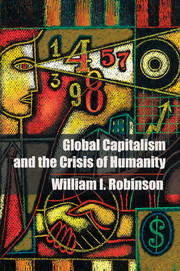Introduction
A Crisis of Humanity
Published online by Cambridge University Press: 05 August 2014
Summary
All men will see what you seem to be; only a few will know what you are.
MachiavelliOur world is burning. We face a global crisis that is unprecedented in terms of its magnitude, its global reach, the extent of ecological degradation and social deterioration, and the scale of the means of violence. This is a time of great upheavals, momentous changes, and uncertain outcomes; fraught with dangers, including the very real possibility of collapse as well as the growing threat of repressive social control systems that serve to contain the explosive contradictions of a global capitalism in crisis. Certainly the stakes bound up in the raging conflicts of our day are too high for the usual academic complacency. I believe that the most urgent task of any intellectual who considers him or herself organic or politically engaged is to address this crisis. If nothing else, we will all agree that global capitalism is a highly unstable and crisis-ridden system. If we are to avert disastrous outcomes we must understand both the nature of the new global capitalism and the nature of its crisis. This book is an attempt to contribute to such an understanding.
In this book I aspire to analyze and theorize the global crisis from the perspective of global capitalism theory. Wide-ranging debate continues on the nature of the twenty-first-century global order and its contemporary crises. I have been centrally concerned with these matters for over two decades, seeking above all to construct a theoretical framework for situating them – specifically, a theory of global capitalism. The world in which Karl Marx analyzed capital has radically changed. The global capitalism perspective offers a powerful explanatory framework for making sense of the crisis. Analysis of capitalist globalization not only says something about the nature of the crisis but is also a template for probing a wide range of social, political, cultural, and ideological processes in this twenty-first century. Following Marx, we want to focus on the internal dynamics of capitalism in order to understand the crisis. And following the global capitalism perspective, we want to see how capitalism has qualitatively evolved in recent decades. The systemwide crisis we face is not a repeat of earlier such episodes such as that of the the 1930s or the 1970s precisely because world capitalism is fundamentally different in the twenty-first century.
- Type
- Chapter
- Information
- Global Capitalism and the Crisis of Humanity , pp. 1 - 15Publisher: Cambridge University PressPrint publication year: 2014



